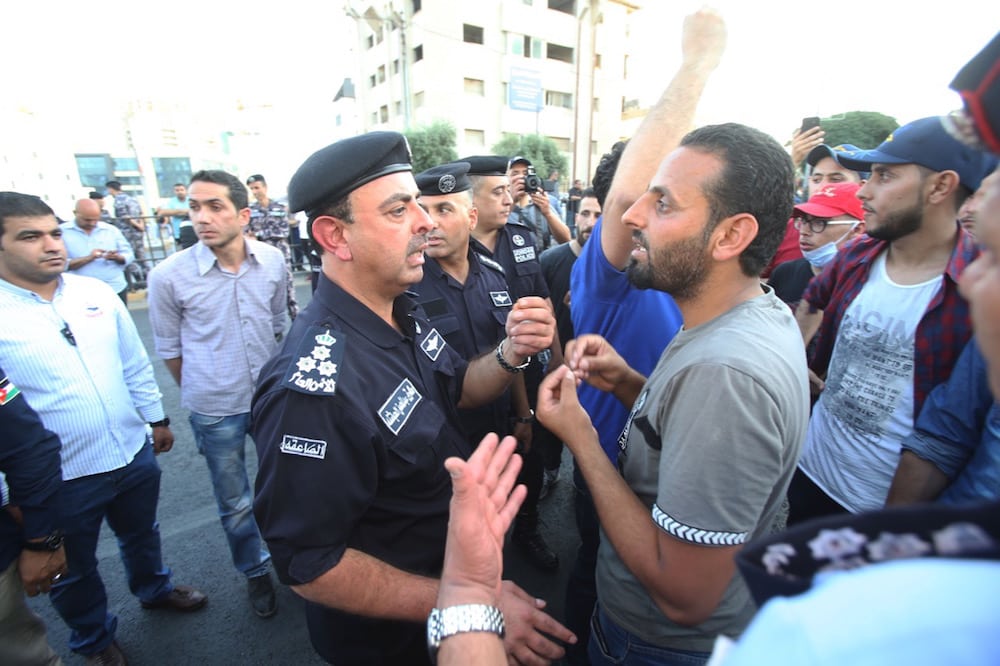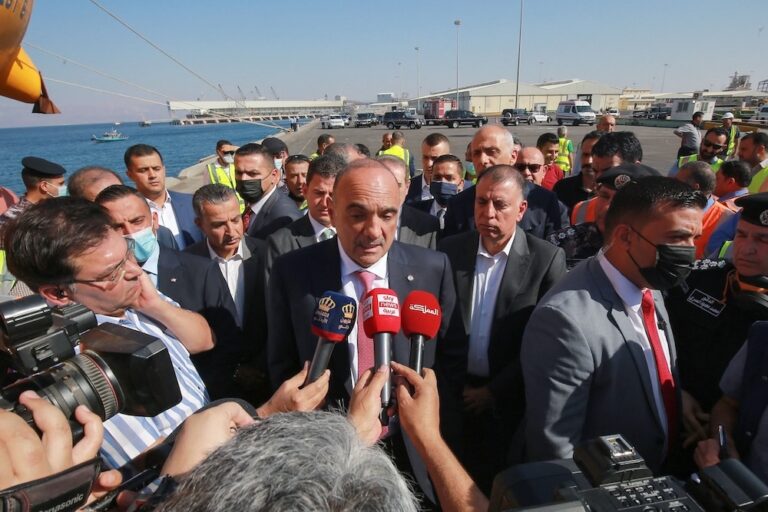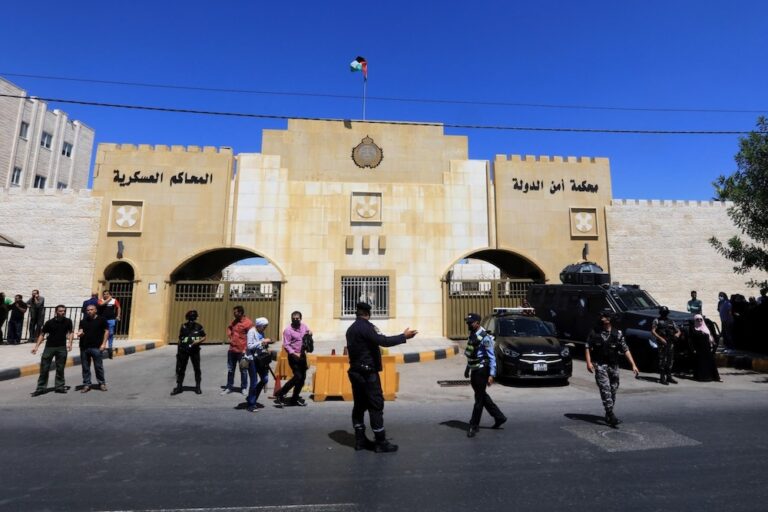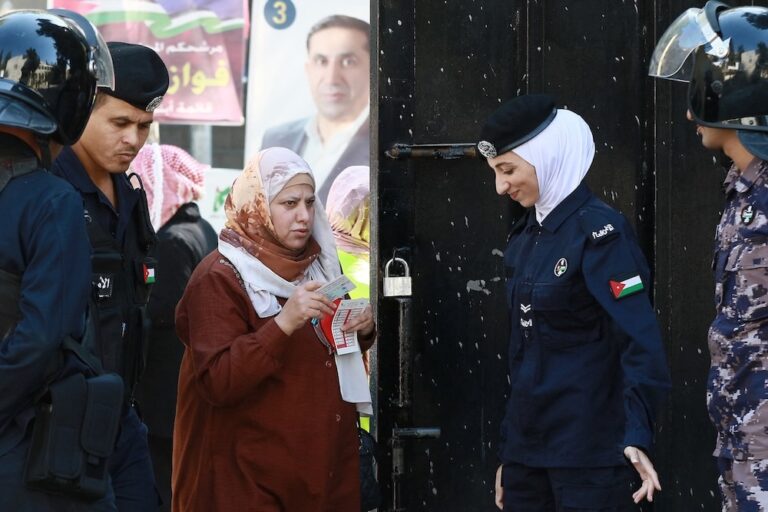Authorities continue to arrest and intimidate protesting teacher union activists one year after authorities suspended the country's largest professional union.
This statement was originally published on gc4hr.org on 14 August 2021.
Nearly a year after the Jordanian Teachers’ Syndicate (JTS) was suspended and its headquarters closed for two years, there is still a lot of abuse in the case of the union and teachers. Jordan has recently witnessed alarming events include a campaign of arrests and intimidation of teachers in addition to bullying of activists in this case. The latest of these incidents was the arrest of the Deputy Head of the JTS, Dr. Nasser Al-Nawasrah, and a number of members of the Syndicate’s council, while they were on their way to Karak Governorate to participate in a sit-in in front of the Syndicate’s branch, in protest against government decisions against the Syndicate and active teachers.
The security forces also arrested about 30 teachers who were present near Al-Thaniya roundabout in Karak Governorate, and closed all secondary and main roads leading to the Syndicate’s branch. They prevented the influx of protesters at the roundabout, which was the location of the teachers’ gathering, according to local media.
This sit-in comes in protest against previous decisions of the Ministry of Education to refer dozens of active teachers belonging to the Syndicate, who have been suspended from work for a year, to early retirement, or “arbitrary transfer”. It is noteworthy that at the end of last year, the Ministry of Education referred dozens of teachers to early retirement, including four members of the Syndicate’s Council, after they participated in the protests against the closure of the Syndicate’s headquarters, and its Council was prevented from working.
However, the Ministry said earlier in a statement to the Arabi21 news website that, “Referrals to retirement are a normal procedure governed by civil retirement laws, the Social Security Law, and civil service regulations and instructions, and their objective is purely organisational. All ministries and government institutions annually refer dozens of employees to retirement, early retirement, and provisional retirement.”
The Ministry continued, “This is taking place in the Ministry constantly. The purpose is to open new vacancies for appointments from the stock of the Civil Service Bureau, and alleviating unemployment suffered by job seekers in various scientific degrees in all disciplines, including teaching, in addition to pumping new blood into the educational process.”
For his part, the director of the Jordanian Labour Observatory, Ahmed Awad, stressed that unionists should be immune from any reprisals, whether from the employer or official authorities, in connection with their union work. He added, “Punishing trade unionists for their union activity is a violation of international labour standards.”
Unresolved Crisis
The JTS is the largest Jordanian professional union, established in 2011, with about 150,000 male and female teachers affiliated to it. But the relationship between the government and the union is tense, as the government says that the union is trying to bully it, twist its arm and mobilise the street, while the union says that it is only demanding rights. In 2019, it carried out the longest and largest strike in the country’s history for a period of four weeks to demand an increase in salaries, as promised by the government in 2014.
Thus, due to the activities of the JTS, which enjoyed wide popular support, especially by teachers, the Deputy Public Prosecutor of Amman decided in July 2020 to stop the members of the Syndicate’s Council from working, and to close its headquarters for two years, as well as preventing publication in the case – local media were absent from covering the arrest of members of the Syndicate’s Council. The Ministry of Education then formed a temporary committee to run the union’s administrative and financial work, until a decision was made on the pending case before the Appeal Court about the suspended Syndicate’s Council. In December 2020, the Jordanian judiciary issued a preliminary decision, dissolving the JTS and imprisoning its Council members for a year, after they were charged with “inciting an assembly” and “inciting hatred”. They were released on bail of USD$700.
It is worth noting that in June 2021, a royal committee was formed to modernise the political system. The committee, which consists of 92 members representing different political and intellectual spectrums and various sectors, is responsible for providing recommendations related to developing legislation regulating local administration, expanding the base of participation in decision-making, and creating a legislative environment and political guarantor of the role of youth and women in public life.
Activists in the teachers’ case called on the Royal Committee to Modernise the Political System, to provide clear guarantees from the executive authority to reverse the decision to suspend the JTS, and to allow the union to return to work as a constitutional and legal right acquired through teachers’ struggles over the past years. Last week, social media circulated news about the meeting of the Chairman of the Royal Committee to Modernise the Political System (former Prime Minister Samir Al-Rifai) and the representative of the JTS Council, Dr. Nasser Al-Nawasrah. All the details of the case and file of the JTS that have been unresolved for more than a year between the government and the union were presented to Al-Rifai, along with the JTS demands to implement the terms of the agreement signed between the union and the government in 2019, to reinstate the teachers subjected to professional and early retirement, and to reopen the Syndicate’s branches, which were closed without legal justification.
Al-Nawasra added that their meeting with Al-Rifai was within the framework of the support of the Royal Committee to Modernise the Political System, where he presented the issues of teachers, stressing that solving the teachers’ file is the first step for political reform and its preludes, for which the committee was established, in order to reach a solution to this important file, which affects a wide segment of the population. Al-Nawasra confirmed that they did not receive any promises from the head of the committee, nor did they offer them any initiatives to resolve the JTS file.
The Gulf Centre for Human Rights (GCHR) condemns in the strongest terms all the arbitrary measures taken by the Jordanian authorities against the JTS, including the use of the judiciary to dissolve it and target its leaders, and declares its full solidarity with the union. The Jordanian government must fully restore the JTS and all its branches and give full legal consideration to all its administrative bodies, including the Council, the central body, and branch bodies.
The government’s duty is to protect union work and not to fight it with arbitrary decisions that contradict the constitution and human rights principles.
GCHR calls on the Jordanian government to sit down at the negotiating table and find an acceptable settlement to this crisis, by implementing the agreement signed between the JTS and the government two years ago, recognising the right of the union and its elected leadership to work freely, to close this file, which has become vexing to the public in Jordan. The authorities in Jordan should stop all arrests of teachers and activists in the JTS and other issues that affect the daily lives of citizens.



